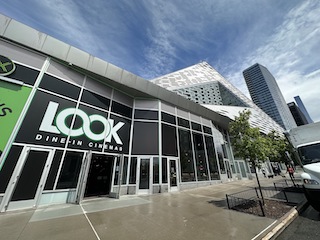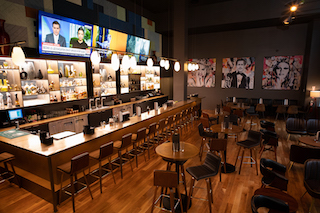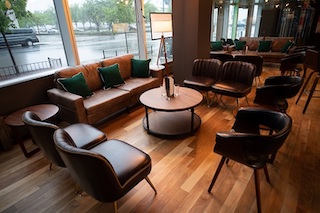 Brian Schultz is the founder and CEO of Look Cinemas. Schultz established Studio Movie Grill in Dallas in 1993, and the company quickly became one of the nation’s most successful dine-in entertainment venues. What seemed an obscure novelty in the ‘90s quickly became one of the industry’s most popular concepts, but that did not save Studio Movie Grill from the pandemic. In a now all-too-familiar story, the pandemic led to many changes for the company, one of which is that Schultz left in 2020 and decided to start a new venture called Look Cinemas. Using a business model similar to, but more ambitious than Studio Movie Grill, Look Cinemas has opened twelve theatres in under two years, most recently on Manhattan’s Upper West Side in the Brutalist VIA building near the Hudson River that was previously occupied by Landmark Theatres. Schultz says, “Ultimately, our purpose is to bring people together. When guests choose Look, we want them to feel like they can escape for a while and share an incredible entertainment experience with the ones they love.” Opening any movie theatre is a serious undertaking but doing it in Manhattan poses challenges that are unlike any place else. I recently spoke with Schultz to learn what obstacles he faced in opening New York City’s newest movie theatre and his vision for the future of not just Look Cinemas but of the exhibition business itself. Here is that conversation.
Brian Schultz is the founder and CEO of Look Cinemas. Schultz established Studio Movie Grill in Dallas in 1993, and the company quickly became one of the nation’s most successful dine-in entertainment venues. What seemed an obscure novelty in the ‘90s quickly became one of the industry’s most popular concepts, but that did not save Studio Movie Grill from the pandemic. In a now all-too-familiar story, the pandemic led to many changes for the company, one of which is that Schultz left in 2020 and decided to start a new venture called Look Cinemas. Using a business model similar to, but more ambitious than Studio Movie Grill, Look Cinemas has opened twelve theatres in under two years, most recently on Manhattan’s Upper West Side in the Brutalist VIA building near the Hudson River that was previously occupied by Landmark Theatres. Schultz says, “Ultimately, our purpose is to bring people together. When guests choose Look, we want them to feel like they can escape for a while and share an incredible entertainment experience with the ones they love.” Opening any movie theatre is a serious undertaking but doing it in Manhattan poses challenges that are unlike any place else. I recently spoke with Schultz to learn what obstacles he faced in opening New York City’s newest movie theatre and his vision for the future of not just Look Cinemas but of the exhibition business itself. Here is that conversation.
 Digital Cinema Report: You recently opened a cinema on the West Side of Manhattan, taking over the space that had previously been part of the Landmark arthouse chain. Given how competitive the New York City market is, what about that location appealed to you?
Digital Cinema Report: You recently opened a cinema on the West Side of Manhattan, taking over the space that had previously been part of the Landmark arthouse chain. Given how competitive the New York City market is, what about that location appealed to you?
Brian Schultz: The West Side of Manhattan is a vibrant and culturally rich area with a strong affinity for the arts. When the opportunity presented itself to establish our presence in such a prominent location, we saw it as a chance to bring our innovative cinema concept to a diverse and discerning audience. We believe in the power of offering a premium and convenient cinematic experience, and we saw great potential in this location to cater to the sophisticated tastes of New York City moviegoers.
Moreover, our commitment to conscious capitalism principles led us to choose this location. We actively seek out communities and leaders who are dedicated to making a difference. By selecting this site, we aim to collaborate with the local community and leaders to not only provide a unique cinema experience but also contribute to the cultural fabric of the West Side. It's an opportunity to be part of a thriving community and support its growth and revitalization.
DCR: How difficult was the process of opening a business in Manhattan and, especially, obtaining a liquor license?
 BS: Opening a business in Manhattan, particularly in the entertainment industry, is no small feat. The city presents unique challenges, from navigating regulatory processes to managing logistical considerations. However, our commitment to conscious capitalism and community-driven initiatives helped us navigate these hurdles.
BS: Opening a business in Manhattan, particularly in the entertainment industry, is no small feat. The city presents unique challenges, from navigating regulatory processes to managing logistical considerations. However, our commitment to conscious capitalism and community-driven initiatives helped us navigate these hurdles.
Obtaining a liquor license was a meticulous process, but it was essential for us to deliver a complete experience for our guests. We worked closely with local authorities, ensuring we met all requirements and adhered to the highest standards of responsible alcohol service. Our dedication to fostering a welcoming and social atmosphere, where moviegoers can enjoy a delicious meal and a refreshing drink while immersing themselves in a film, motivated us to overcome any obstacles that came our way.
DCR: The Manhattan location is one of ten theatres that you have opened in the past ten months. That seems very aggressive. What led to your decision to open so many cinemas so soon after the pandemic?
BS: The decision to open multiple cinemas shortly after the pandemic was rooted in our unwavering belief in the resilience and enduring appeal of the cinematic experience. We recognized the pent-up demand for shared entertainment experiences and saw an opportunity to provide an elevated and safe environment for moviegoers. Our commitment to conscious capitalism played a significant role in this decision as well.
DCR: In addition to Manhattan, where are the other theatres you opened recently and what thinking went into the selection of each site? How does Look Cinemas evaluate a potential location for a theatre?
 BS: Since June of 2021, we have opened and currently operate 12 theaters located in Texas, California, Florida, Arizona, Georgia and New York.
BS: Since June of 2021, we have opened and currently operate 12 theaters located in Texas, California, Florida, Arizona, Georgia and New York.
Carefully evaluating potential locations, we sought out communities and leaders who share our vision and are committed to making a positive impact. Each theater opening was a deliberate step towards not only expanding our business but also revitalizing communities. We firmly believe that cinema has the power to bring people together, spark conversations, and foster a sense of belonging. By opening these cinemas, we aimed to meet the demand and create a haven where people can escape, connect, and experience the magic of film.
DCR: You have said that exhibition is an essential part of the overall motion picture business. What makes you say that?
BS: Quoting Jason Silva, “The importance of film cannot be overstated. It allows us to inhabit different characters, travel the world, and experience complete lives within a shared community for two hours. Film is a powerful medium that transcends boundaries and connects us on a deep emotional level. It has the ability to challenge our perspectives, evoke empathy, and ignite meaningful conversations.”
DCR: Look Cinemas seems to exemplify the fact that the show business experience starts long before the movie starts. What do you look for when it comes to hiring and training the people who run your cinemas?
BS: Look Cinemas exemplifies the fact that the show business experience starts long before the movie starts. We recognize the transformative power of film and the importance of creating an immersive and communal experience for our guests. When it comes to hiring and training the people who run our cinemas, we look for individuals who share our passion for storytelling and understand the impact that film can have on people's lives.
